What do clothes tell us about the man?
When people start reading through the Bible they sometimes get discouraged when the storyline seems to grind to a halt and they are inundated with the laws of the Mosaic covenant and details regarding the tabernacle and its service. Do not give up reading! Do not be tempted to think that this is not relevant!
Jesus said “It is written about me in the scroll– I have come to do your will, O God.'” 8 First he said, “Sacrifices and offerings, burnt offerings and sin offerings you did not desire, nor were you pleased with them” (although the law required them to be made). (Hebrews 10:7-8)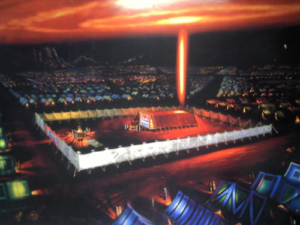
All the services of the tabernacle point to the perfect, once and for all sacrifice of Jesus Christ and His office as our Great High Priest (Hebrews 10).
The Psalmist said, “And in His temple everything says, ‘Glory’”! (Psalm 29:9b). The same could be said about the Tabernacle.
The Tabernacle speaks of the glory of Christ. The brazen altar speaks of His once and for all sacrifice on the Cross; the laver, the washing of His Word; the Holy Place, His sufficiency on our behalf; the Holiest of All speaks of the place He has opened up to those who believe, a place of communion with the glory of God. Through Jesus’ death, the veil in the temple that separated the place of communion (the Holiest of All) from the place of service in the Holy Place, is torn from top to bottom (Matthew 27:51). He did this so that sinners would no longer be excluded from God’s glorious presence. We have access by a new and living way which He inaugurated for us by becoming both our High Priest and our Perfect Sacrifice for sin (Hebrews 10:20).
Exodus 28 speaks of the clothing of the High Priest. What do the clothes tell us about the man who wears them?
God had His Son in mind when He gave Moses the directions regarding the clothing that was to be worn by the High Priest (Aaron) who would be set apart for a special ministry.
The High Priest is to wear these clothes “for glory and beauty” (v.2). Everything about the man should be inspiring and causing us to think of Jesus, who because of His priestly work was “crowned with glory and honor” (Hebrews 2:7,9).
THE LINEN EPHOD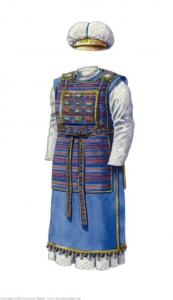
The linen ephod was the first piece that is described in detail. It was created of fine white linen, which represents righteousness (Rev 19:8). As mentioned before, linen was fabric created from flax, a vegetable. It is representative of the individual righteousness of Christ Jesus, who like a seed fell into the ground and died that He would not abide alone, but that His righteousness would be reproduced in us (John 12:24). Linen speaks of a life of grace. This clothing would not cause sweat (Ezekiel 44:18). The clothing was not to represent our works but the work of the perfect God-man on our behalf Who imputes His righteousness to us. The ephod was a short coat, decorated with embroidery in Messianic colors- gold (representing deity), blue (heaven), purple (royalty) and scarlet (redemption). It had no sleeves and was fastened closely to the body with a sash of the same material and multicolored ornamentation. The shoulder sections of the ephod were buttoned together, attaching to 2 precious onyx stones set in gold filigree, one on each shoulder. On these two stones were inscribed the names of the sons of Israel in the order of their birth, 6 on each stone. Gold chained cords from the stones on the shoulders would be used to attach the breastplate.
The ephod tells us that Jesus is full of grace and truth. He is fit to minister on our behalf and carry the weight of our concerns and solve our problem of guilt before the Lord.
BREASTPLATE
The breastplate (chest piece) was a pouch of folded cloth, nine inches square, to carry the two stones for decision making, the Urim and the Thummim (28:30). It would be made in a fashion similar to the ephod, with linen and threads of gold, blue, purple and scarlet. The pouch had four rows with three gemstones in each row, representing the twelve tribes of Israel. Two gold rings on the top inside edges of the breastplate would be used to attach the breastplate to the ephod below the shoulder pieces. The bottom rings would attach to the ephod with blue cords just above the decorative sash (girdle).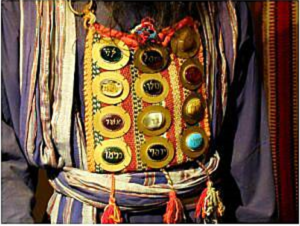
What is significant here is that the High Priest would have the names of the children of Israel both on his shoulders and over his heart when he goes into the Holy Place!
Psalm 115:12 (NASB) 12 The LORD has been mindful of us; He will bless us; He will bless the house of Israel; He will bless the house of Aaron.
Isaiah 49:16 (NASB) 16 “Behold, I have inscribed you on the palms of My hands; Your walls are continually before Me.
As our mediator, He is fully equipped to make known the will of God to us.
THE ROBE (Exodus 28:31-35)
The robe was a single garment of blue worn underneath the ephod. It was seamless from top to bottom, as was the coat that was taken from Jesus Christ at the cross (John 19:23).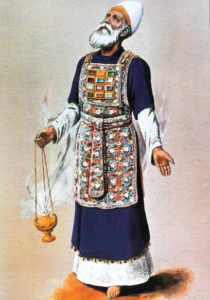
Warren Wiersbe notes: “The collar around the opening for the head was woven so that it would not tear. During our Lord’s ministry on earth, some people tried to “tear” the seamless robe of His character and accuse Him of wrong, but they never succeeded.” Bible Exposition Commentary (BE Series) – Old Testament – The Bible Exposition Commentary – Pentateuch
Pomegranates of purple and blue (fruit of a royal and heavenly color) were attached to the hem of the High Priest’s robe with golden bells between them all around.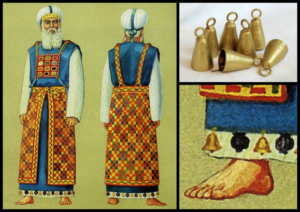
The golden bells of the robe made a joyful sound, alerting the people who could not see behind the veil, that the High Priest was alive, and His work performed on their behalf was being accepted by God. This was significant, because if the Priest did not fulfill His duties according to the law, and went into the Holiest of All without the Blood of the Atoning Sacrifice sprinkled on the mercy seat, He would die (Exodus 28:35). The bells would stop ringing and the priests in the Holy Place would have to pull out his body with the cords attached to his robes.
Psalm 89:15 (NASB) 15 How blessed are the people who know the joyful sound! O LORD, they walk in the light of Your countenance.
Jesus as our Great High Priest is our Living Savior! There is no substitute for the One who became the perfect (once and for all) substitute for us. He communicates the life of heaven and makes it possible for us to bring forth eternal fruit as we abide in Him.
THE TURBAN WITH THE GOLDEN MEDALLION (Exodus 28:36-38).
A linen turban was made as a headpiece for the High Priest. A plate of pure gold, with “Holiness to the Lord” engraved on it, was fastened to the turban with a cord of blue.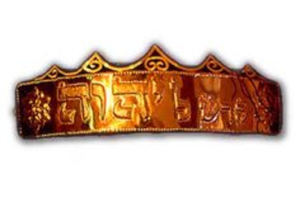 There is only one priest who wore the golden plate on the turban. He was the High Priest, who was representing the Perfect Priesthood of Christ. The whole purpose of the Levitical priesthood was to show the way of ‘Holiness unto the Lord’. This could only be done by another who would act on our behalf.
There is only one priest who wore the golden plate on the turban. He was the High Priest, who was representing the Perfect Priesthood of Christ. The whole purpose of the Levitical priesthood was to show the way of ‘Holiness unto the Lord’. This could only be done by another who would act on our behalf.
Hebrews 9:24 (NASB) 24 For Christ did not enter a holy place made with hands, a mere copy of the true one, but into heaven itself, now to appear in the presence of God for us.
Hebrews 7:26 (NASB) 26 For it was fitting for us to have such a high priest, holy, innocent, undefiled, separated from sinners and exalted above the heavens.
AARON’S SONS ARE CONSECRATED
Aaron’s sons foreshadow the priestly ministry of believers. We too are clothed with the garments of salvation, set apart by the anointing of the Holy Spirit who teaches us to pray. Our nakedness has been covered with the righteousness of Another.
NEW TESTAMENT READING: MATTHEW 25:31- 26:13
Only a few days before Jesus is taken by the authorities to be crucified, He warns His hearers of His Second Coming. The Day of the Lord will be a Day of Judgment, for individuals, communities and nations (Matt 25:32). The Day of the Lord will be a Day of Vindication. First, the Lord Jesus will be fully vindicated. Every eye will see Him. Every knee will bow. Everyone will be called to account. He is coming back as King of Kings. Secondly, it will be a Day of Vindication for those who put their trust in Him and have born His reproach in the world. Those who identified with Christ and His people to the degree that they were not ashamed to offer acts of service in His Name to those who bore His Name. “For I was hungry and you gave me food, I was thirsty and you gave me drink. I was a stranger and you welcomed me, I was naked and you clothed me, I was sick and you visited me, I was in prison and you came to me’”
The righteous will answer him, saying, “When did we see you in these conditions?”
And the King will answer them, “Truly, I say to you, as you did it to one of the least of these my brothers, you did it to me.” (Matt 25:40)
Believers who have been made right with God by faith will experience a work of grace that makes them compassionate towards ‘the least of these’, his brothers.
This parable applies specifically to how we treat our persecuted believers and, in the context of Jesus’ discourse on the Mount of Olives, it refers especially to those persecuted in the Great Tribulation.
The Bible reminds us that even believers will have to give an account in a public place of judgment. They are not judged for their sin, but the judgment will make plain how the work of grace was manifested in their lives and towards others (2 Cor 5:10; 1 Cor 3:11-15).
Will that Day reveal that we are truly His sheep? Or were we goats?
THE PLOT TO KILL JESUS
Jesus predicts His death (Matt 26:1). The religious crowd plot it (v.3) but God has planned it for His redemptive purpose.
THE EXAMPLE OF EXTRAVAGANT DEVOTION
A woman, whom John identifies as Mary, the sister of Lazarus and Martha (John 12:3) breaks a box made of imported alabaster from Egypt and pours out its contents of precious spikenard ointment on Jesus’ head. This fragrant oil was used only for solemn acts of devotion rather than for anointing guests. It is estimated that it would have cost an amount equivalent to an annual salary (300 denarii – Mark 14:5). Judas, who moments later, would be betraying Jesus for 30 pieces of silver, rebukes this act of devotion as unnecessarily extravagant. “To what purpose is this waste?” some disciples ask. Judas says, “Why was this ointment not sold for three hundred denarii and given to the poor?” John records that Judas said this not because he cared about the poor, but because he was a thief, and having charge of the moneybag he used to help himself to what was put into it.
Are we the kind of people who scoff acts and expenditures of devotion to Jesus? If so, where is our heart? Are we taking that which does not belong to us and spending for our own purposes? Mary knew that all that she had and all that she needed was right before her. It was to be found in Jesus. Jesus did not rebuke this expenditure. He praised it and promised that wherever the gospel is preached, Mary’s act of devotion will be held up as a memorable example. How differently Judas is held up as an example!
TODAY’S READING FROM PSALMS – Psalm 31:9-18.
The Psalmist is being targeted by his enemies and has been on the receiving end of slander. In the midst of his hardships however he finds a refuge in the Lord. He knows his help comes from a God who is good, merciful and kind.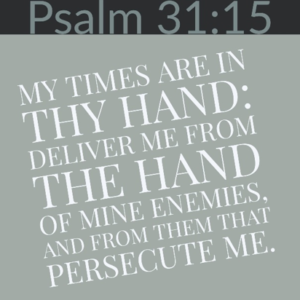
Psalm 31:19 19 How great is Your goodness, which You have stored up for those who fear You, which You have wrought for those who take refuge in You, before the sons of men!
PROVERBS FOR TODAY- Proverbs 8:12-13
Proverbs 8:12-13 12 “I, wisdom, dwell with prudence, And I find knowledge and discretion. 13 The fear of the LORD is to hate evil; Pride and arrogance and the evil way and the perverted mouth, I hate”.
In order to have a good love life, we must also have a hate life. What that means is that if we love health, we will hate disease, if you love holiness, you hate sin. If you fear the Lord, you hate evil. The Psalmist said, “I hate vain thoughts” (Psalm119:113). How is it with your hate life?
PRAYER: O Lord, we want to be found ready for Your appearing. We want to worship you worthily. We want to value Your Word more than our necessary food. We want to show kindness to all people, especially to the household of faith. Thank You for Your provision in Christ Jesus Whom You have made to be for us our righteousness, our sanctification, and redemption. We are grateful that He has secured our adoption into Your family, and access into Your presence by the Holy Spirit. We want to be like Mary, recklessly abandoned in submission to worship You with our obedience. Fill us with Your Spirit and enable us to live a life that is fruitful and pleasing to You. In Jesus’ Name.
Pastor David
